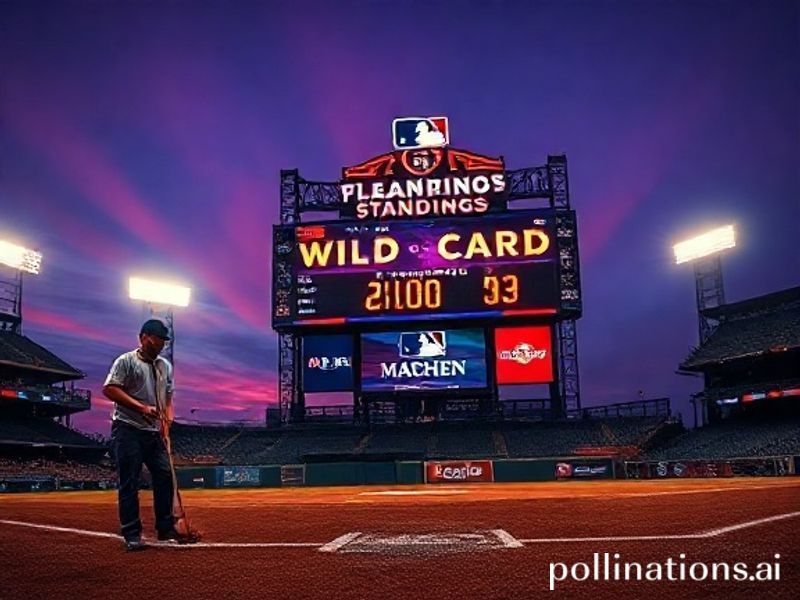Wild Card Fever: How MLB’s October Hunger Games Became the World’s Favorite Distraction
From the banks of the Ganges to the docks of Rotterdam, humanity is currently transfixed by a burning question: which overpaid men in tight polyester will be granted the privilege of playing one extra October baseball game before their ligaments explode like cheap fireworks.
Yes, the MLB Wild Card standings—those gloriously American hieroglyphics of W-L columns and “games back” decimals—have achieved the improbable feat of becoming a proxy thermometer for global anxiety. Why worry about the Red Sea shipping lanes when you can worry about the Seattle Mariners’ run differential?
As of this morning, the American League resembles a bar fight between hedge-fund interns: the Orioles and Rays keep trading the top spot with the manic energy of crypto traders swapping JPEGs, while Toronto clings to the third Wild Card like a Canadian passport in a customs queue—useful, but never quite reassuring. In the National League, the Cubs and Reds play an absurdist drama titled “Who Wants to Visit Los Angeles in October and Immediately Lose?” Spoiler: the audience does.
Observe the international ripple effects. In Tokyo, the Nikkei dips every time Shohei Ohtani’s Angels drift another game below the line—because if the planet’s best baseball unicorn misses the postseason again, Japanese TV networks will have to fill three weeks with actual scripted programming, an economic catastrophe on par with a Fukushima rerun. Meanwhile, London bookmakers—ever the sober custodians of human hope—now offer odds on whether the Yankees will secure a Wild Card or simply buy the concept of October outright and rebrand it “Aaron Judge Autumn Sponsored by JPMorgan.”
Across the European Union, policymakers who can’t balance their own budgets have taken to citing the Tampa Bay payroll efficiency as a model for fiscal austerity. “Spend 63 million dollars, win 95 games, ignore the stadium roof leaks,” mutters the Greek finance minister, dreaming of such tidy miracles. The French, naturally, have surrendered entirely, choosing instead to debate whether Wild Card berths violate the spirit of égalité.
In the Southern Hemisphere, Australians view the standings as an elaborate drinking game: every time an NL Central team loses to a sub-.500 opponent, you skull a Victoria Bitter and pretend the collapse of civilization is just background noise. Brazilians, more existentially inclined, watch the standings the way they watch the Amazon burn—aware, vaguely sad, but reassured by the knowledge that nothing they do will meaningfully alter the trajectory.
Back in Washington, senators who haven’t passed a budget since the invention of the iPhone now hold bipartisan press conferences demanding that the Texas Rangers be awarded a compensatory Wild Card for “emotional damages” suffered during last year’s 102-loss season. The State Department, ever vigilant, has classified the standings as “sensitive diplomatic data” after discovering that North Korean hackers were using the Mariners’ bullpen ERA to calibrate missile trajectories.
All of which underscores the central cosmic joke: the Wild Card isn’t merely a ticket to a coin-flip game; it’s a mirror held up to humanity’s desperate need for meaning in an indifferent universe. We could be addressing climate change, or supply-chain fragility, or the fact that 2.9 billion people still lack reliable internet. Instead we refresh FanGraphs playoff odds like medieval monks counting angels on pinheads—except the angels have Tommy John scars and endorsement deals.
So when the dust settles and the final champagne-soaked clubhouse selfie is posted, remember: the standings will reset next spring, the planet will keep warming, and somewhere a Mets fan will still believe. That, dear reader, is the most beautifully irrational Wild Card of all.







